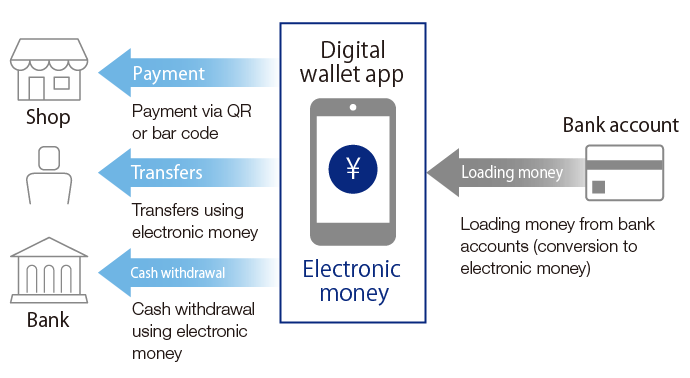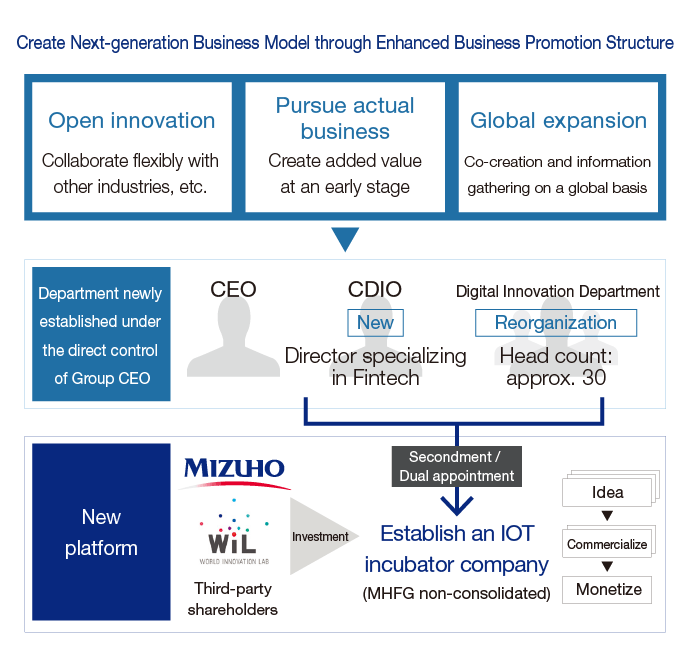Leading Financial Innovation
Through making use of cutting–edge technology and collaborating with external organizations, Mizuho is endeavoring to provide highly convenient services for its customers more so than before

Approach to Financial Innovation
Financial Environment
In recent years, a worldwide trend toward offering innovative financial services has emerged, and it has been referred to as "Fintech." Fintech includes such technologies as big data, artificial intelligence (AI), and blockchain, and it is looked to as the harbinger of new financial services. Along with this trend, in Japan also, the Banking Act has been revised to enable financial institutions to collaborate with venture businesses that are expected to develop new financial services to promote open innovation. In this connection, the so–called "5% rule," which, under the Banking Act, limited voting ownership in other companies by financial institutions to 5% has been relaxed for enabling investment into finance–related IT companies (Fintech companies).
Directions for Mizuho's Initiatives
Mizuho, as a megabank, has built up, on the one hand, a customer base and an information base, while also developing strengths in the form of financial knowledge and technology. On the other hand, Mizuho's business position has not always been strong in terms of innovative creation, advanced technology, and assessment of future business potential. In today's business environment, by collaborating with large vendors that have these strengths and Fintech companies, Mizuho is looking to create new businesses and provide highly convenient services for our customers more so than before, as to establish an advanced brand image as a financial institution.
Promotion Structure
To attain these goals, Mizuho established its Incubation Project Team, an independent and specialized team in July 2015 to strengthen new business creation and initiatives across the group. In addition, beginning in April 2017, to reinforce the creation of new businesses and realize greater efficiency and sophistication in existing businesses, we established the position of CDIO*, who is in charge with the mission of driving digital innovation. Accompanying the appointment of a CDIO, we also realigned our Incubation Project Team to form the Digital Innovation Department to enhance the structures for promoting digital innovation.
* Chief Digital Innovation Officer
Fiscal 2016 Results
In fiscal 2016 also, Mizuho continued to actively pursue collaborative businesses with other companies to provide new services through open innovation.
Big Data and AI–based Fintech Lending Services
 In November 2016, Mizuho and Softbank set up a joint company, named J.Score, to provide big data and AI–based Fintech personal lending services, and this company has already begun activities to build its brand image. Beginning in September 2017, it is scheduled to provide the first score–based lending services via smartphones in Japan, and it will continue to gradually raise the level of its services.
In November 2016, Mizuho and Softbank set up a joint company, named J.Score, to provide big data and AI–based Fintech personal lending services, and this company has already begun activities to build its brand image. Beginning in September 2017, it is scheduled to provide the first score–based lending services via smartphones in Japan, and it will continue to gradually raise the level of its services.
Establishment of Fintech Laboratory Facilities
 In October 2016, the first laboratory facilities1 were established for structuring a Fintech Ecosystem2 and to improve customer services. With the establishment of this facility, it will be possible to combine the technologies and knowledge of the Fintech companies with Mizuho's knowledge of financial services to facilitate open innovation and provide speedy technical verifications.
In October 2016, the first laboratory facilities1 were established for structuring a Fintech Ecosystem2 and to improve customer services. With the establishment of this facility, it will be possible to combine the technologies and knowledge of the Fintech companies with Mizuho's knowledge of financial services to facilitate open innovation and provide speedy technical verifications.
- Innovation lab set up within the FinTech Center of Tokyo Finolab, which is jointly operated by Mitsubishi Estate, Dentsu, and Information Services International–Dentsu.
- An industrial ecosystem created through the multi–faceted, continuous, interrelated connections between Fintech companies, financial institutions, businesses, investors, regulatory authorities, and specialists such as lawyers and accountants.
Verification of Services Utilizing Blockchain Technology
Mizuho is promoting the use of blockchain technology for financial services by working toward the start–up of the first verification project led by Japanese companies that will make use of this technology for global international remittances and international securities settlement services.
New Payments Services
In October 2016, Mizuho began collaboration with Metaps and WiL, with the aim of joint business development. The goals of this collaboration is to utilize the customer bases and knowledge on financial services of the MHFG and MHBK to create and offer new financial settlement services.

Offering Services Using Robotics
Mizuho has installed humanoid robots programmed with AI in its branches to provide functions that include analyzing customers' insurance coverage and providing support for opening customer accounts. In addition, to provide completely new services that have not existed before, Mizuho is giving consideration to using the knowledge and know–how that it has accumulated from these initiatives in other channels other than robots, including mobile devices and ATMs.
Our Measures Going Forward
Since establishing its Incubation Project Team, Mizuho has conducted surveys and research, principally in key component technologies such as big data, AI, and blockchain from the medium– to long–term perspective, and accumulated knowledge and know–how. Beginning in fiscal 2017, Mizuho has gone beyond just accumulating this technology and knowhow and is endeavoring to provide customers with even better services through creating new businesses as well as improving the efficiency and sophistication of existing businesses.
Specifically, since 2016, Mizuho has been taking initiatives to release new services, such as new lending schemes and settlement methods as well as gone to commercialize blockchain technology for use in the trade finance field.
Moreover, Mizuho's activities in this field have not been limited to finance, but also have included the establishment of new companies with WiL and other new venture investment companies based in Silicon Valley. After having established these new companies, Mizuho will be also engaged in creating next–generation business models and actual commercialization of related businesses through the broad use of IoT.
